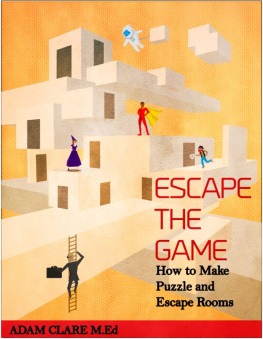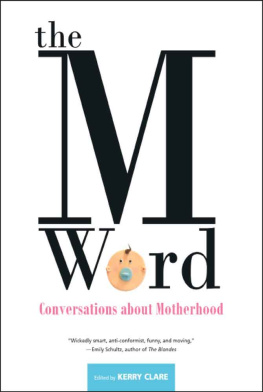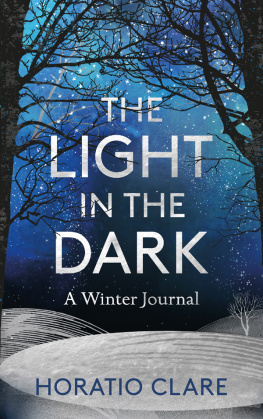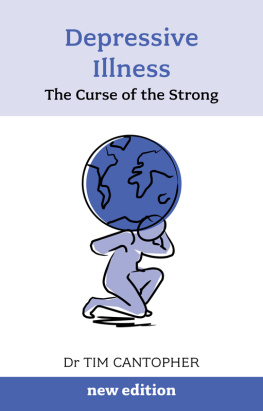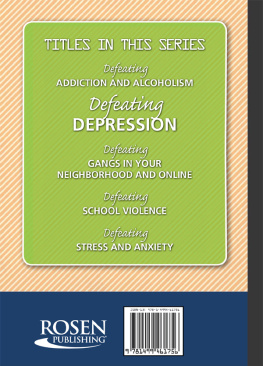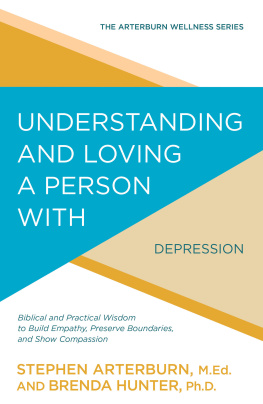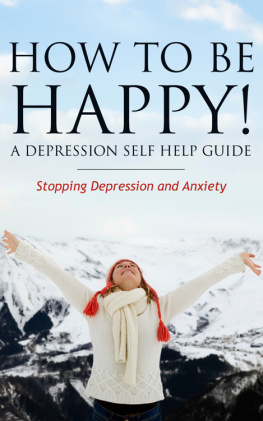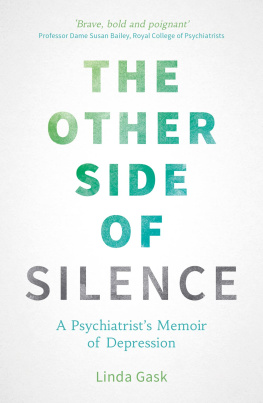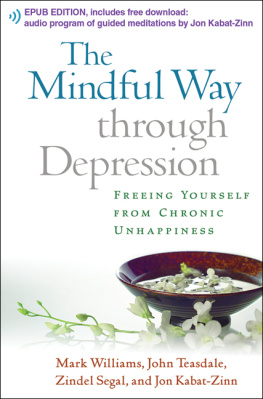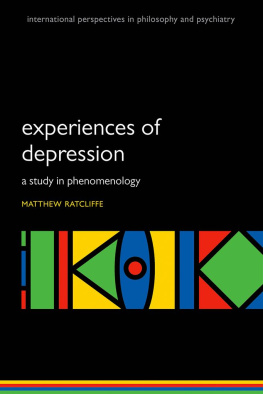Depression And How To Survive It
Spike Milligan was perhaps best known as one of the goons. He went on to become one of Britain's foremost comic writers and performers. His bestselling titles include Adolf Hitler: My Part in His Downfall, Puckoon and Where have all the Bullets Gone? He died in 2002.
Dr Anthony Clare is well known in the UK and Ireland for presenting programmes about psychiatry on BBC TV and radio. He is the author of several popular books on psychiatry and is now a Consultant General Adult Psychiatrist at St Edmondsbury Hospital in Dublin.
A grief without a pang, void dark and drear,
A drowsy, stifled, unimpassioned grief,
Which finds no natural outlet or relief
In word, or sigh, or tear.
'Dejection', Samuel Taylor Coleridge
This eBook is copyright material and must not be copied, reproduced, transferred, distributed, leased, licensed or publicly performed or used in any way except as specifically permitted in writing by the publishers, as allowed under the terms and conditions under which it was purchased or as strictly permitted by applicable copyright law. Any unauthorised distribution or use of this text may be a direct infringement of the author's and publisher's rights and those responsible may be liable in law accordingly.
ISBN 978-1-4070-9613-1
Version 1.0
www.randomhouse.co.uk
First published by Arrow Books in 1994
19 20 18
Copyright Spike Milligan Productions Ltd
and Anthony Clare
The right of Spike Milligan and Anthony Clare to be identified
as the authors of this work has been asserted
by them in accordance with the
Copyright, Designs and Patents Act, 1988
This electronic book is sold subject to the condition that it shall not by way of trade or otherwise, be lent, resold, hired out, or otherwise circulated without the publisher's prior consent in any form other than that in which it is published and without a similar condition including this condition being imposed on the subsequent purchaser
First published in the United Kingdom in 1993 by
Ebury Press
Arrow Books
The Random House Group Limited,
20 Vauxhall Bridge Road, London SW1V 2SA
www.rbooks.co.uk
Addresses for companies within The Random House Group Limited
can be found at: www.randomhouse.co.uk/offices.htm
The Random House Group Limited Reg. No. 954009
A CIP catalogue record for this book
is available from the British Library
ISBN: 978-1-4070-9613-1
Version 1.0
MANIC DEPRESSION
The pain is too much
A thousand grim winters
grow in my head
In my ears
the sound of the
coming dead.
All seasons
All sane
All living
All pain.
No opiate to lock still
my senses
Only left.
The body locked tenses.
Spike Milligan
St Luke's Hospital,
Psychiatric Wing
1953/4
INTRODUCTION
IT is one of the most commonly occurring disorders and also one of the most distressing. At any one time about three million people in Britain are suffering from it. Every year in Britain nearly 4000 people kill themselves while experiencing its severest symptoms. It is easily diagnosed, yet in as many as one-third of sufferers it remains undetected. Although it is eminently treatable, many sufferers never receive any adequate therapy whatsoever. It is hidden, misunderstood and feared. It is depression.
Some years ago, Pat Phoenix, celebrated for her role as Elsie Tanner in the long-running television soap opera Coronation Street, died of cancer. The occasion of national mourning was used to put across a message to the public concerning the prevalence of the disease, the current state of the battle against it and the need for greater public understanding and commitment.
Around the same time, the television personality Ted Moult shot himself. The media were dumbfounded. Testimonies to Moult's love of life, vigour, energy and commitment flowed in such profusion as to make his suicide all the more arbitrary, incomprehensible and irrational. In fact, Ted Moult had suffered an attack of depression and had killed himself in a torment of despair.
When a well-known figure dies of cancer, the opportunity is taken to educate the general public concerning this awesome disease. Newspapers offer updates on what is known about it, and there is advice on prevention, early detection, energetic treatment, the general outcome.
Yet when a seriously depressed individual dies by his or her own hand, the media are mute as if with embarrassment and shame, and the public are left bemused, suspicious, uncomprehending. Nobody learns anything about the disorder depression save that it is inexplicable. As a result, this common, debilitating and, in certain instances, deadly condition has languished, its sufferers silent and ignored, their families shamed and guilty, their friends baffled and uneasy. Such voices as are raised on their behalf are largely those of professionals and the growing number of voluntary associations dedicated to raising the profile of psychiatric ill-health.
The inability of people to admit to a history of psychiatric ill-health for fear of discrimination, dislike or isolation has deprived psychiatry of an important source of public education, information and demystification which is available to other branches of medicine, such as cardiology or cancer research. Cardiac bypass and transplantation surgery, for example, have benefited enormously from the public testimony of grateful and successfully treated patients. Illnesses such as diabetes, asthma, disseminated sclerosis and Parkinson's disease have been rendered less mysterious and perhaps even less frightening by people who have these illnesses speaking up and bearing witness to the effectiveness of modern treatment, the progress in understanding the disease and the need for further research.
In 1992 the Royal College of Psychiatrists began a five-year Defeat Depression Campaign to raise public awareness concerning the condition. A series of surveys of the general population that it commissioned MORI to conduct as part of this campaign revealed the extent of the problem. Most of the people surveyed had considerable difficulty defining clinical depression. There is clearly a stigma attached to psychiatric problems; sufferers are presumed to be weak, abnormal and unstable. Most people felt that physical illness is easier to sympathize with because it is easier to see than mental illness. Events thought likely to cause depression included having a baby, marital breakdown and loss of a job, but few people in the survey acknowledged the possibility of a physical cause.
Given that people see depression as linked with the individual's ability to cope with life, it is perhaps not surprising that they regarded counselling as the most important form of treatment. Counselling ranged from talking to a friend or family member to consulting a general practitioner or psychiatrist. Antidepressants were not understood at all; confused with tranquillizers, they were believed to be addictive. Hence, drug treatment was not generally favoured.
A series of surveys of non-medical professionals involved in health care, also commissioned in 1992 by the Royal College of Psychiatrists, revealed a very similar picture. Depression was not seen as a serious illness and the potential risk was missed by many.
There were, however, some hopeful findings too in these surveys. In the MORI poll, over 90 per cent of the public polled agreed that people suffering from depression deserve more understanding from their family and friends than they get at present. Over 90 per cent agreed that anybody can suffer from depression indeed, 54 per cent revealed that they, a close relative or a friend had suffered from depression. Over 70 per cent believed that depression is a medical condition, like bronchitis or arthritis.


